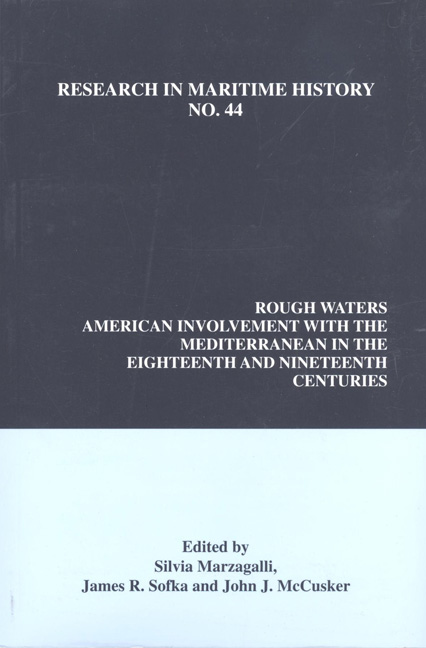Book contents
- Frontmatter
- Contents
- About the Editors
- Contributors' Notes
- “Rough Waters: American Involvement in the Mediterranean in the Eighteenth and Nineteenth Centuries: An Introduction”
- “Worth a War? The Importance of the Trade between British America and the Mediterranean”
- “Relations between North America and the Italian Peninsula, 1763-1799: Tuscany, Genoa and Naples”
- “American Shipping into the Mediterranean during the French Wars: A First Approach”
- “Notes toward a Franco-American Mediterranean 'From Below'”
- “Consuls and Consiglieri: United States Relations with the Italian States, 1790-1815”
- “Old and New Republics: Diplomatic Relations between the Republic of Genoa and the United States of America”
- ‘“From the Halls of Montesuma, to the Shores of Tripoli:’ Antoine Zuchet and the First Barbary War, 1801-1805”
- “Minorca: The First United States Naval Base in the Mediterranean and the American Consulate at Port Mahon”
- “‘The Jeffersonian Idea of National Security’ Revisited”
- “The Reluctant Warrior: Thomas Jefferson and the Tripolitan War, 1801-1805”
- “Slavery as Social Mobility? Western Slaves in Late Eighteenth Century Algiers”
- “Americans in the Mediterranean in the Late Eighteenth and Early Nineteenth Centuries: Concluding Remarks”
“Rough Waters: American Involvement in the Mediterranean in the Eighteenth and Nineteenth Centuries: An Introduction”
- Frontmatter
- Contents
- About the Editors
- Contributors' Notes
- “Rough Waters: American Involvement in the Mediterranean in the Eighteenth and Nineteenth Centuries: An Introduction”
- “Worth a War? The Importance of the Trade between British America and the Mediterranean”
- “Relations between North America and the Italian Peninsula, 1763-1799: Tuscany, Genoa and Naples”
- “American Shipping into the Mediterranean during the French Wars: A First Approach”
- “Notes toward a Franco-American Mediterranean 'From Below'”
- “Consuls and Consiglieri: United States Relations with the Italian States, 1790-1815”
- “Old and New Republics: Diplomatic Relations between the Republic of Genoa and the United States of America”
- ‘“From the Halls of Montesuma, to the Shores of Tripoli:’ Antoine Zuchet and the First Barbary War, 1801-1805”
- “Minorca: The First United States Naval Base in the Mediterranean and the American Consulate at Port Mahon”
- “‘The Jeffersonian Idea of National Security’ Revisited”
- “The Reluctant Warrior: Thomas Jefferson and the Tripolitan War, 1801-1805”
- “Slavery as Social Mobility? Western Slaves in Late Eighteenth Century Algiers”
- “Americans in the Mediterranean in the Late Eighteenth and Early Nineteenth Centuries: Concluding Remarks”
Summary
In his path-breaking study of the sixteenth-century Mediterranean world, Fernand Braudel identified the “invasion” by Atlantic ships and merchants as one of the major, long-lasting events in the history of the Mediterranean Sea in early modern times. According to Braudel, the arrival of English, Flemish and French Atlantic vessels and their captains began discretely in the early sixteenth century as a result of an increased Mediterranean demand for cheap transport services. Within a few decades, however, northern Europeans evolved from a complementary to a commanding position in the region. Atlantic shipping and trade came to dominate the most lucrative Mediterranean trades, and the Atlantic powers steadily imposed their rules and politics on Mediterranean countries, progressively subordinating the region to Atlantic interests. Their de facto commercial presence was reinforced by the establishment of consulates (the first English consuls settled in Naples and Marseilles in 1461) and trade treaties (the first capitulations between the Ottoman Empire and France and Great Britain were signed in 1535 and 1580, respectively, on the model of the Venetian ones) and were enforced by an assertive military force, initially privateers and later navies (the first arrival of the English navy in the Mediterranean was in 1620). From the early seventeenth century, Northern merchants established themselves in major Mediterranean ports. After the British and the Dutch, other Atlantic powers followed; Danish and Swedish ships, for example, ventured into the Mediterranean in the eighteenth century. The result, according to Braudel, was unquestionable: “Il y a eu, par la ruse, la force et la violence, par le jeu des différences économiques, une conquête de la mer Intérieure par les Nordiques.”
This account has been challenged, most recently by Molly Greene, who has insisted on the vitality of Mediterranean (notably Greek) shipping and trade, especially in the lucrative eastern Mediterranean markets. She has suggested a different picture of the Mediterranean, one which was characterized by the particular situation and determined by the relative weakness of surrounding countries. According to Greene, the penetration of Northern shipping into Mediterranean trade happened more slowly than Braudel had claimed, and it became enmeshed in a network of intra-Mediterranean relations: “The northern Europeans, then, were just one group among many in the complex of commercial activity in the seventeenth century. […]
- Type
- Chapter
- Information
- Rough WatersAmerican Involvement with the Mediterranean in the Eighteenth and Nineteenth Centuries, pp. 1 - 6Publisher: Liverpool University PressPrint publication year: 2010

